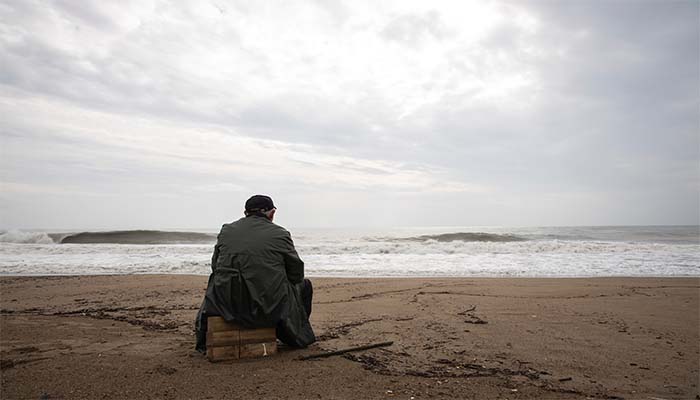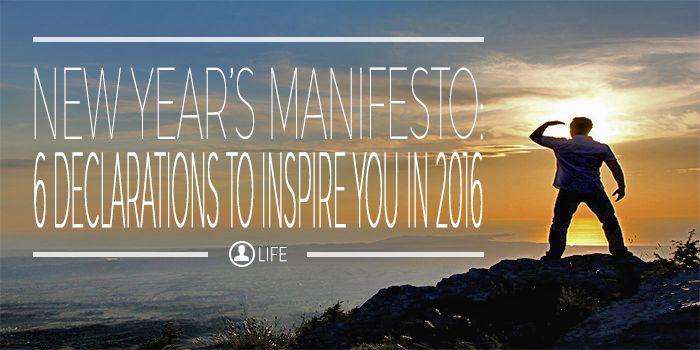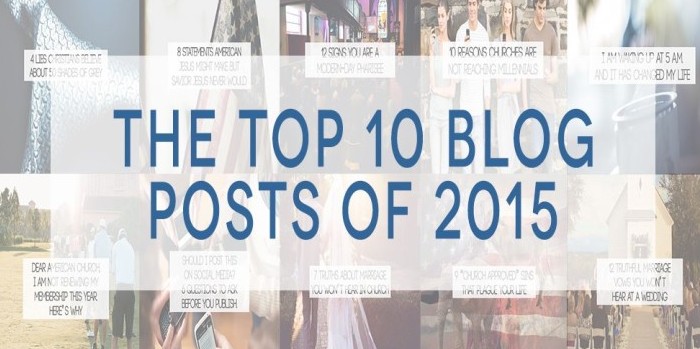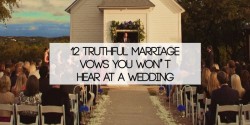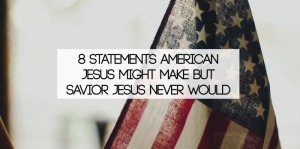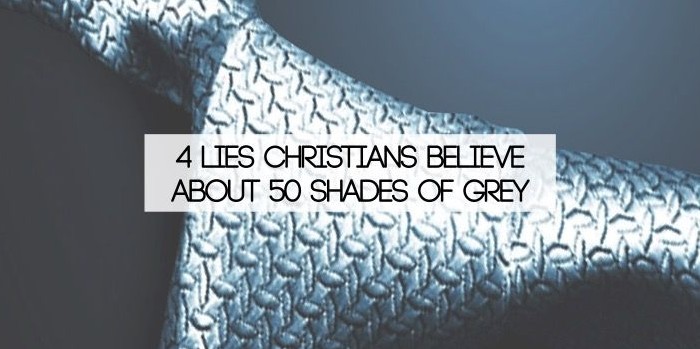We live in uneasy times. The anxiety is tangible. You can feel it the way you feel a summer’s day in my hometown of Birmingham. It’s heavy, like your breathing under water, like you can’t catch your breathe. Our world feels that way right now, doesn’t it? Gun control. Abortion. The war in Ukraine. Sexual abuse in the church. I’m to the point where I have pre-pre traumatic stress disorder. I’m anticipating the anticipation of the next cultural earthquake, bracing myself for an event that hasn’t happened but will happen soon, maybe today.
Combine this unsteadiness with the opinions of every human at our fingertips, and you have a world that threatens to implode on itself. In times like this, what do we do? We disconnect and meditate and pray. Pssh. Please.
We pick up our digital box and open our social media app of choice. And what do we see? The musings of the people who think like we do. We turn to our news source of choice and what do we hear? The ramblings of talking heads who pamper to our perspective.
The ground underneath our feet is shaking hither and tither, and we need a firm place to stand. So, we double down on the voices we know. These voices seem so certain, so sure of what’s right and what’s wrong, and we want to be on the right side of every issue, so we turn on Fox News or CNN or whatever and we allow these sources to cement our worldview.
And, look, I get it. I’m penning these words because I feel the pull to hunker down in my little corner and shout truth bombs at every unsuspecting person in my path.
Look, there’s Larry. Larry believes guns are the savior of the world. Larry owns enough guns to supply a small platoon. Well, take this, Larry.
“The answer to gun violence isn’t more guns. It’s gun control. You’re living in fear, Larry, and as long as people like you love their guns as much as they love their God, our land will overflow with the silent cries of innocent lives taken too soon.”
Boom. Direct hit.
And, here’s the thing: I’m right. Most days I’m convinced that if every human adopted my worldview, every problem would float into thin air – poof! – and disappear. This sounds prideful and arrogant – and it is – but it’s true.
If you’re honest with yourself, though, you feel the same way. All of us, to some degree, suffer from certainty bias. We believe our perspective is THE perspective and all others perspectives are wrong, at best, and the manifestation of Satan’s plan to take over the world, at worst.
THE DESIRE FOR CERTAINTY IS KILLING US
I want to ask you a question, though, a question I’ve asked myself in recent days.
Has my desire to be right made me a healthier, more engaged and loving person?
Here’s another question: Has our desire to be on the right (or left) side of arguments helped us becoming the kind of community that respects and humanizes every one, regardless of worldview?
I can’t answer that for you, but I can for me. The answer is no. I’m more anxious and less hopeful today than I was a few years ago. I have less love and respect for people with a different worldview than I ever have. The world is caving in. And it’s their fault.
Friends, this is not okay. We don’t exist to convince the world that we’re right. I’m beginning to realize that even if I did, by some divine sorcery, convince every human to think just like me, I wouldn’t find the peace I desire. I don’t think you would either.
Our collective anxiety and constant access to technology has duped us, tricked us into believing it’s more important to be right than to love our neighbor. I could give you all sorts of Scriptures and theology to support this, but that’s not necessary, is it? Just look around. Or in the mirror. We indict ourselves. What we’re doing right now isn’t working, and we know it.
We need a new path, an alternative way forward.
Fortunately, we don’t have to continue like this. We can choose another way, a way that opens our hearts and minds, a way that gives our souls rest. And this way starts with three words:
I. Don’t. Know.
This is the way of uncertainty. Can you imagine a world like this? A world where we don’t need things to resolve, where we recognize and embrace our limitations, a world where we realize we don’t know everything. We don’t even know most things. And that’s okay.
CERTAINTY IS AN IDOL
Certainty is one of the greatest idols of our time. I know this because we’ve justified its existence for so long, we now call it a virtue. When you begin to champion something that drains life from your soul, you’re in trouble. Big trouble.
And we’re in big trouble. In every Christian community I’ve been around, certainty is a mark of mature faith. The more certain you are about what the Bible says and how God interacts with the world and so on, the more likely you are to become a leader in the church. The more knowledge you acquire, the closer you are to God.
The goal of Christian living is to acquire knowledge about Jesus, not follow him. Again, I know this because most Christians, myself included, can tell you where Jesus would land on every issue and who he would hang with in every situation, but their behaviors and actions look nothing like the Son of God.
JESUS DIDN’T CARE ABOUT CERTAINTY
Meanwhile, Jesus, wasn’t concerned with clear or correct thinking. If certainty mattered to God, Jesus failed. God’s son often spoke in parables and used unclear, mirky stories to talk about God. He said over and over that the kingdom is like this or that. He frustrated religious leaders because he side-stepped direct questions about important religious things, like the sabbath or the after life.
And when he chose his disciples, he didn’t show up to the local Bible college and ask for the best students. He went to the streets and chose the outcasts and misfits, people who knew little to nothing about religion.
I’m convinced that if the Savior of the World stood in our midst today, both sides of the spectrum would find him deeply unsatisfying. Jesus wouldn’t land on one side of an issue because Jesus didn’t care about being right.
Jesus came to destroy the idol of certainty. He came to make a mockery of correct thinking. Jesus came to break us from the trance of needing to be right. You can’t love people if you feel compelled to correct them. And Jesus cared about loving people.
Let’s admit – and I’m talking to Christians here – we care more about acquiring knowledge and fine-tuning our theology than caring for people.
We care more about labeling people than loving them.
And this has made us anxious, angry, depressed, lonely people. Would you agree? We’re divided, fractured, fragmented. A pro-lifer, for example, doesn’t just see a pro-choicer (that’s not a word, I know) as someone with a faulty view. They’re the enemy. Them, those guys, over there, they’re the reason the world is caving in. If they would just repent of their incorrect thinking, everything would be fine.
Would it, though?
We don’t need any more correct thinkers We need more people who can – with great courage – admit the obvious:
I. Don’t. Know.
THE SPIRITUAL BENEFITS OF SAYING I DON’T KNOW
1. I don’t know connects us with God.
It dismantles the either-or mindset that separates us from our neighbor and stunts our spiritual growth. You can’t grow if you believe you’re right. What’s the point? You have it all figured out.
2. I don’t know heals us, physically, mentally, and spiritually.
Say the words out loud. If you’re like me, you feel something in your bones. Do you feel it? It’s your ego and the accompanying anxiety releasing ts grip on your heart and mind. You don’t know it all. You don’t need to. It’s okay if you’re unsure. Your body knows certainty is unhealthy, toxic to your health. Saying I don’t know is self-care. It’s a healing balm to your physical body.
3. I don’t know opens the door to transformation.
Not the kiddie pool transformation we see in American Christianity, where being a Christian means adhering to the cultural values – security, prosperity, progress, etc. Oh, and, of course, certainty. No, this is real transformation, where we begin to see things as they are, not as we are. Where we begin to grow in love and peace and joy. Where we see our neighbors as a reflection of ourselves.
4. I don’t know allows us to see people as image-bearers, not as a collection of issues.
Correct thinking almost always leads to dehumanization. Saying I don’t know allows you to re-humanize people. Think about your own life. No matter where you land on an issue. How do you feel about those on the other side. Hmm. Do you love them? Or do you see them as problems to be resolved? For me, it’s the latter. That’s why I need this alternative way, the way of I don’t know.
Once I don’t need to be right, I’m free to be curious, to hear everyone’s story. Why does my neighbor support strong gun laws? Did he grow up in an unsafe home? Is he a military veteran who’s seen the worst in humanity? Or what about my pro-choice neighbor? Why does she support abortion? Maybe she grew up with abusive parents or she was forced to raise her siblings because her parents absent or something like that. She knows that you can be alive without ever living.
Regardless, it’s clear what we’re doing now isn’t working. It’s not working because it’s not the way of Jesus. We’ve allowed the world to convince us that certainty equals faithfulness and it doesn’t. There’s nothing noble or godly about certainty.
The way of Jesus, the way of Healing, begins with three words:
I. Don’t. Know.
May we have the courage to walk this path.
Grace and peace, friends.





